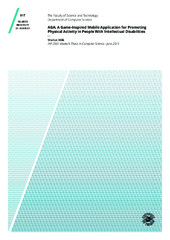AGA: A Game-Inspired Mobile Application for Promoting Physical Activity in People With Intellectual Disabilities
Permanent link
https://hdl.handle.net/10037/15781View/
(PDF)
(MPEG-4 video)
(MPEG-4 video)
Date
2019-05-31Type
Master thesisMastergradsoppgave
Author
Wiik, Marius FoshaugAbstract
Obesity and other health problems have a high prevalence in people with intellectual disabilities.
Many lead a sedentary lifestyle and often have low scores on fitness indicators such as muscle strength and cardiovascular fitness.
The purpose of this research is to identify design techniques and features of a mobile application that can help promote physical activity in people with intellectual disabilities.
We review literature found in a literature review, consider mobile applications from a doing a state of the art review and through other research.
We also receive input from experts in the field and inspiration from other applications and use the information to identify features of a mobile application which can promote physical activity by being fun, engaging and motivating.
We identify techniques and factors to consider when designing a mobile application accessible to people with intellectual disabilities.
Lastly, we conduct a real-world usability test where people with intellectual disabilities and their support staff use the application and give feedback.
We create AGA (Activity Gaming Avatar), a 3D training partner presented in a mobile application which can demonstrate physical activity exercises and dances with music to people with intellectual disabilities and users can earn points through completing workouts.
The application is set up with longevity in mind where adding new exercises and clothing items is made easy.
Results from the usability tests show potential to help and motivate people with intellectual disabilities to become more physically active.
Both users and staff reported enjoying using the application and users were able to navigate and exercise with it without much assistance, and upon trying to retrieve the testing gear, we were compelled to leave it there as they had too much fun with it.
The resulting 3D avatar application is shown to be a facilitator of physical activity in people with intellectual disabilities.
We achieve this through introducing fun and motivation using praise and giving the user contingent rewards.
The long term effects remain to be measured, but according to preliminary tests, the application can have a significant impact on the physical fitness of people with intellectual disabilities as well as encouraging positive attitudes towards being physically active.
In the long run, making this group of people healthier can lead to them being better integrated into society, better mental health and reduced government expenses incurred by reduced productivity and treatment of medical problems caused by obesity or poor mental health.
Publisher
UiT Norges arktiske universitetUiT The Arctic University of Norway
Metadata
Show full item recordCollections
Copyright 2019 The Author(s)
The following license file are associated with this item:


 English
English norsk
norsk
